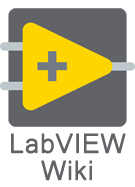Package Manager Comparison: Difference between revisions
Appearance
ChrisCilino (talk | contribs) No edit summary |
ChrisCilino (talk | contribs) No edit summary |
||
| Line 67: | Line 67: | ||
| Supports 64 bit without manual intervention?<sup>3</sup> || Yes || || Yes|| Yes || No | | Supports 64 bit without manual intervention?<sup>3</sup> || Yes || || Yes|| Yes || No | ||
|- | |- | ||
| Supports offline\copies of repsoitories<sup> | | Supports offline\copies of repsoitories<sup>11</sup> || || || || || | ||
|} | |} | ||
Revision as of 02:01, 5 March 2020
This is the comparison of package management solutions in the LabVIEW community.
| Characteristic | VI Package Manager (Free) | VI Package Manager Community Edition (Free For Non Comerical Use) | VI Package Manager (Pro $599/user/year) | NI Package Manager | G Package Manager (GPM) |
|---|---|---|---|---|---|
| Installs With LabVIEW | Yes | No | Yes | No | |
| Created By | JKI | JKI | JKI | National Instruments | MGI (Moore Good Ideas) |
| Year Released | ? | 2020 | ? | 2017 | 2018 |
| Open Source | No | No | No | No | Yes |
| Language Written In | G | G | G | C# | G |
| Free To Install | Yes | Yes | Yes Trial | Yes | Yes |
| API | No | No | Yes | Yes | Yes |
| Local repository management1 | No | No | Yes | Yes | No |
| Supports multiple LabVIEW versions from a single package | Yes | Yes | Yes | No | Yes |
| Natively supports mass compile after install | Yes | Yes | Yes | No | Yes |
| Scope of package installation2 | LabVIEW IDE | LabVIEW IDE | LabVIEW IDE | LabVIEW IDE | Per Project5 |
| Supports LabVIEW NXG | No | No | No | Yes | No |
| Integrates Into LabVIEW IDE8 | No | No | No | No | No |
| Integrates Into LabVIEW NXG IDE9 | No | No | No | Yes | No |
| Create palettes as a part of the package creation | Yes | Yes | Yes | No | No |
| Supports Installation to symbolic paths (user.lib) | Yes | Yes | Yes | No | N/A6 |
| Support Structure | JKI online support | JKI online support | NI Forums | GitLab Issue Tracking and Wiki10 | |
| Supports Pre Build Step | No | Yes, G Code | Yes - via Source Distribution, G Code | No | |
| Supports Post Build Step | No | Yes, G Code | Yes - via Source Distribution, G Code | No | |
| Supports Pre Install Step | Yes, G Code | Yes, G Code | Yes - via exe/bat (Advanced: must pack the package) | No | |
| Supports Post Install Step | Yes, G Code | Yes, G Code | Yes - via exe/bat (Configurable from LabVIEW IDE) | No | |
| Supports Pre Uninstall Step | Yes, G Code | Yes, G Code | Yes - via exe/bat (Configurable from LabVIEW IDE) | No | |
| Supports Post Uninstall Step | Yes, G Code | Yes, G Code | Yes - via exe/bat (Advanced: must pack the package) | No | |
| Supports N post install/pre uninstall steps | No | No | Yes | No | |
| Supports N Post Install All steps | No | No | Yes | No | |
| Supports Automatic Dependency Scanning4 | No | Yes | No | Yes | |
| Has a dedicated package manager application | Yes | Yes | Yes | Yes | |
| Packages Searchable via Web Page | Yes | Yes | No | Yes | |
| Has a community repository of packages | No | No | No | Yes | |
| Can list packages created by other package managers as dependencies7 | No | No | No | No | |
| Supports 64 bit without manual intervention?3 | Yes | Yes | Yes | No | |
| Supports offline\copies of repsoitories11 |
| Detail Number | Additional Information |
|---|---|
| 1 | Repository types: A global repository is accessible to anyone. A local repository is created by an individual (company, etc.) and hosted on a local server. |
| 2 | Scope of Package Installation: determines if multiple versions of a package are allowed or if you may have only one version of a package. |
| 3 | GPM can place files anywhere. However, as of 0.2.0-35, GPackages installed for LabVIEW 64 bit will open, but cant find linked VIs. The GPackage(s) directories must be mass compiled to allow LabVIEW to relink the VIs to eachother. |
| 4 | Example |
| 5 | LabVIEW IDE Coming Soon |
| 6 | Coming Soon |
| 7 | Only packages of the same type can be listed as dependencies. For example, a VI Package can only depend on other VI Packages. A VI Package cannot depend on a NI Package. |
| 8 | There is no user experience to find, install, upgrade, remove, or autodetect packages from within the LabVIEW IDE. |
| 9 | NI Package manager is integrated into the NXG IDE so that the user may find the package responsible for installing missing gvis without leaving the IDE. |
| 10 | GPM is open source. The community can contribute to fix issues, add features and make support better. |
| 11 | For some organizations, a connection to the internet is not allowed. This feature allows you to internet-based repositories and host them locally for your organization. |
